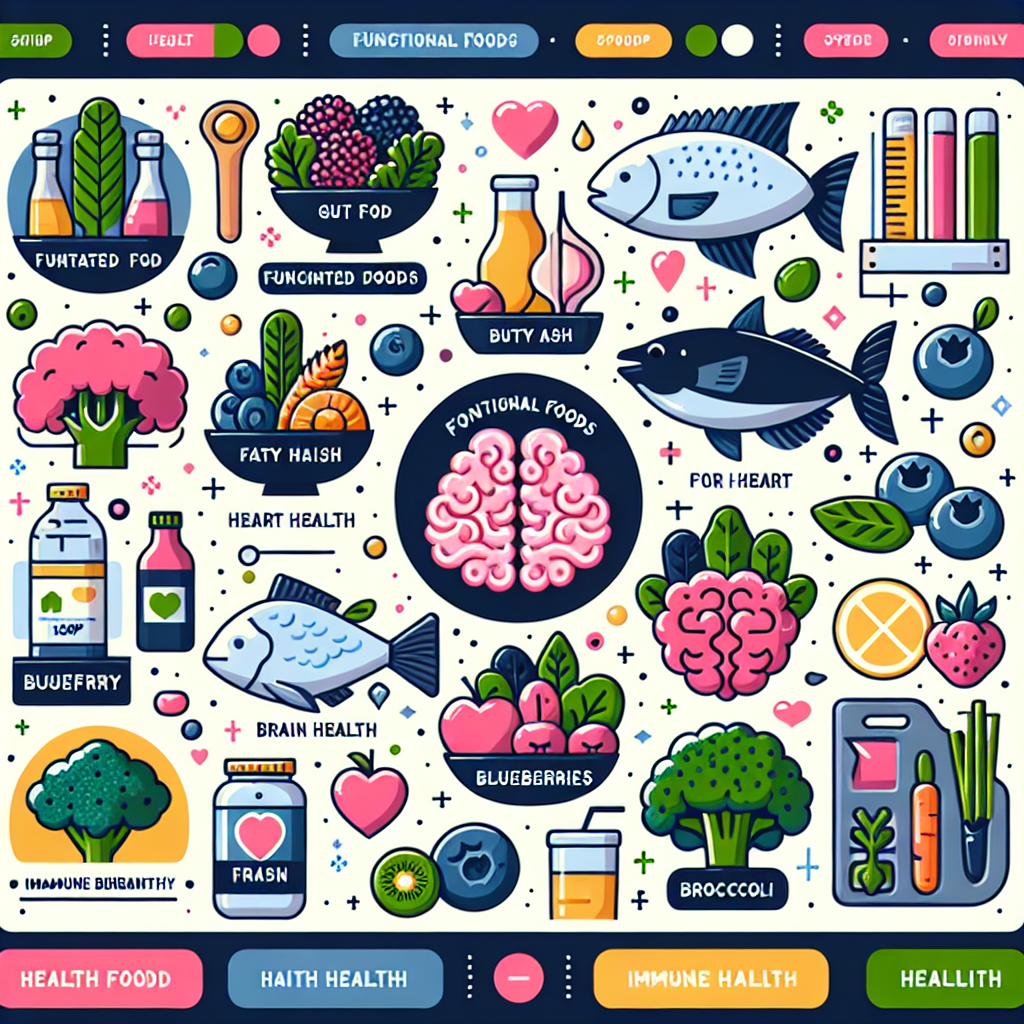How Functional Foods Improve Your Health

Discover how Functional Foods can significantly improve your health! Learn more about their benefits and how to incorporate them into your daily diet. Don’t wait, start your journey to a healthier lifestyle today. Click here to find out more.
Exploring the Health Benefits of Functional Foods
Functional foods, a term that has been gaining popularity in the health and wellness industry, refer to foods that have a potentially positive effect on health beyond basic nutrition. These foods contain bioactive compounds that provide health benefits beyond their nutritional value, helping to reduce the risk of chronic diseases and improve overall health.
The concept of functional foods is rooted in the simple idea that the food we consume should do more than just satisfy our hunger. It should also contribute to our long-term health and wellness. This idea is not new; in fact, it has been a cornerstone of traditional medicine systems like Ayurveda and Traditional Chinese Medicine for centuries. However, it is only recently that modern science has begun to explore and validate the health benefits of functional foods.
Functional foods can be categorized into two groups: conventional and modified. Conventional functional foods are naturally rich in bioactive compounds. These include fruits and vegetables, nuts and seeds, whole grains, fish, and dairy products. On the other hand, modified functional foods have been fortified, enriched, or enhanced to increase their health benefits. Examples include orange juice fortified with calcium or bread enriched with folic acid.
One of the primary benefits of functional foods is their ability to reduce the risk of chronic diseases. For instance, fruits and vegetables are packed with antioxidants, which help to neutralize harmful free radicals in the body. Free radicals are unstable molecules that can cause oxidative stress, leading to chronic diseases like heart disease and cancer. By consuming a diet rich in antioxidant-rich functional foods, we can help to protect our bodies from these diseases.
Functional foods can also play a crucial role in supporting our digestive health. Many functional foods, such as whole grains and fermented foods like yogurt and kimchi, are rich in dietary fiber and probiotics. These compounds help to support a healthy gut microbiome, which is essential for digestion and overall health. A healthy gut microbiome has been linked to a lower risk of conditions like obesity, type 2 diabetes, and inflammatory bowel disease.
Moreover, functional foods can help to support our mental health. Emerging research suggests a strong link between diet and mental health, with certain foods showing potential to boost mood and reduce the risk of mental health conditions. For example, fatty fish like salmon and mackerel are rich in omega-3 fatty acids, which have been shown to reduce symptoms of depression and anxiety.
In conclusion, functional foods offer a promising approach to improving our health and reducing the risk of disease. By choosing foods that offer more than just basic nutrition, we can harness the power of diet to support our health in a holistic way. However, it’s important to remember that functional foods are not a magic bullet for health. They should be consumed as part of a balanced diet, alongside regular physical activity and other healthy lifestyle habits. As always, it’s best to consult with a healthcare professional before making any major changes to your diet or health routine.
How Functional Foods Boost Your Immune System

Functional foods, a term that has been gaining popularity in the health and wellness industry, refer to foods that have a potentially positive effect on health beyond basic nutrition. These foods contain bioactive compounds that provide health benefits and can help prevent diseases. One of the most significant benefits of functional foods is their ability to boost the immune system, which is our body’s primary defense against diseases and infections.
The immune system is a complex network of cells, tissues, and organs that work together to protect the body from harmful invaders like bacteria, viruses, and other pathogens. A strong immune system is crucial for maintaining good health. However, factors such as stress, lack of sleep, poor diet, and aging can weaken the immune system, making us more susceptible to infections and diseases. This is where functional foods come into play.
Functional foods are packed with vitamins, minerals, fiber, antioxidants, and other nutrients that can strengthen the immune system. For instance, citrus fruits like oranges, lemons, and grapefruits are rich in vitamin C, a powerful antioxidant that boosts the immune system by stimulating the production of white blood cells, which are essential for fighting off infections. Similarly, foods like yogurt, kefir, and other fermented foods are loaded with probiotics, beneficial bacteria that support gut health, which is closely linked to immune function.
Moreover, functional foods like garlic, ginger, and turmeric have been used for centuries in traditional medicine for their immune-boosting properties. Garlic contains compounds that enhance the immune system’s cell function, while ginger has anti-inflammatory and antioxidative properties that can improve the immune response. Turmeric, on the other hand, contains curcumin, a compound known for its anti-inflammatory effects, which can modulate the immune system.
In addition to these, functional foods like green tea, almonds, and mushrooms also play a significant role in boosting the immune system. Green tea is packed with flavonoids, a type of antioxidant that enhances immune function. Almonds are rich in vitamin E, a key nutrient for maintaining a healthy immune system. Mushrooms, particularly shiitake and maitake varieties, are known for their immune-boosting properties due to their high content of beta-glucans, a type of fiber that activates the immune system.
However, while functional foods can significantly boost the immune system, it’s important to remember that they are not a magic bullet for health. They should be part of a balanced diet, combined with regular exercise, adequate sleep, and a healthy lifestyle. Over-reliance on functional foods without considering other aspects of health can lead to an imbalance in nutrient intake and may not provide the desired health benefits.
In conclusion, functional foods offer a natural and effective way to boost the immune system and improve overall health. Incorporating a variety of these foods into your diet can provide a wide range of nutrients that can enhance your immune function, protect against diseases, and promote optimal health. However, it’s essential to maintain a balanced diet and a healthy lifestyle for these foods to work their magic effectively. So, the next time you’re at the grocery store, consider adding some functional foods to your shopping cart. Your immune system will thank you.
The Role of Functional Foods in Preventing Chronic Diseases
Functional foods, often referred to as “nutraceuticals,” are foods that provide health benefits beyond basic nutrition. These foods contain bioactive compounds that can help prevent chronic diseases and improve overall health. The role of functional foods in preventing chronic diseases is increasingly being recognized by health professionals and consumers alike, as they offer a natural and holistic approach to health management.
Functional foods range from everyday items like fruits, vegetables, and whole grains, to more specialized products like fortified dairy products, probiotic yogurts, and omega-3 enriched eggs. These foods are rich in antioxidants, dietary fiber, probiotics, and essential fatty acids, all of which play a crucial role in maintaining optimal health.
Antioxidants, for instance, are compounds that help protect the body from damage caused by harmful molecules known as free radicals. A diet rich in antioxidants can help prevent a host of chronic diseases, including heart disease, cancer, and neurodegenerative disorders like Alzheimer’s disease. Fruits and vegetables, particularly those with deep colors like berries, spinach, and bell peppers, are excellent sources of antioxidants.
Dietary fiber, another key component of functional foods, is essential for maintaining a healthy digestive system. It aids in the prevention of various digestive disorders, including constipation, diverticular disease, and colorectal cancer. Moreover, dietary fiber can help control weight by promoting feelings of fullness, and manage diabetes by slowing the absorption of sugar into the bloodstream. Whole grains, legumes, fruits, and vegetables are all high in dietary fiber.
Probiotics, beneficial bacteria that reside in the gut, are another important aspect of functional foods. They help maintain a healthy gut microbiome, which is linked to a wide range of health benefits, from improved digestion and nutrient absorption to enhanced immune function. Probiotic-rich foods include fermented products like yogurt, kefir, sauerkraut, and kimchi.
Lastly, essential fatty acids, particularly omega-3 fatty acids, are vital for heart health. They help lower levels of bad cholesterol, reduce inflammation, and decrease the risk of heart disease. Foods rich in omega-3 fatty acids include fatty fish like salmon and mackerel, flaxseeds, chia seeds, and omega-3 enriched eggs.
Incorporating functional foods into your diet can significantly improve your health and reduce the risk of chronic diseases. However, it’s important to remember that these foods are not a magic bullet. They should be part of a balanced diet, coupled with regular physical activity and other healthy lifestyle habits.
Moreover, while functional foods can contribute to disease prevention, they should not replace medical treatment. If you have a chronic disease or are at high risk, it’s crucial to seek professional medical advice and treatment.
In conclusion, functional foods offer a promising approach to disease prevention and health improvement. They provide essential nutrients and bioactive compounds that can help protect against chronic diseases and promote overall health. By incorporating these foods into a balanced diet, we can take a proactive step towards better health and wellbeing.